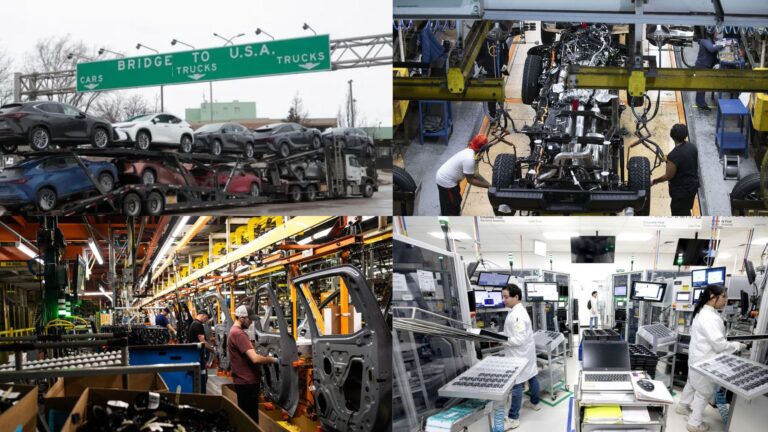U.S. automakers are expressing disappointment following the recently announced trade agreement with Japan, signaling that the deal falls short of their expectations. Despite hopes for improved market access and reduced barriers, industry leaders say the provisions offer minimal benefits and fail to address longstanding challenges in the Japan automotive market. As negotiations conclude, the reaction from Detroit highlights the complexities and ongoing frustrations in U.S.-Japan trade relations.
U.S. Automakers Face Persistent Barriers Despite New Japan Trade Agreement
Despite hopes that the recent trade agreement between the United States and Japan would open doors for American automakers, industry leaders remain cautiously skeptical. Many of the critical barriers that have long hindered U.S. car manufacturers’ access to the Japanese market persist, including stringent safety standards, non-tariff regulations, and distribution system challenges. While the deal includes promises of increased transparency and some tariff reductions, the practical impact on U.S. vehicle exports to Japan is expected to be minimal.
Key issues still blocking significant market penetration include:
- Safety and Environmental Regulations: Japan’s unique testing and certification processes continue to be costly and time-consuming for U.S. automakers.
- Dealer Network Barriers: The Japanese market’s deeply entrenched distribution systems favor domestic brands and complicate entry for foreign companies.
- Consumer Preferences: Japanese buyers exhibit strong brand loyalty, often favoring domestic vehicle models with proven track records.
| Barrier | Impact on U.S. Automakers | Agreement Outcome |
|---|---|---|
| Certification Processes | Delays exports by months | Limited streamlining promised |
| Dealer Network Access | Restricts sales channels | No significant changes |
| Consumer Preferences | Low brand recognition | Unaddressed in deal |
Tariff Reductions Fall Short in Addressing Key Export Challenges
Despite incremental tariff reductions resulting from the latest trade agreement, U.S. automakers argue that the concessions fail to tackle the deeper structural barriers hindering their success in the Japanese market. While headline figures suggest a modest easing of import duties, companies continue to grapple with stringent non-tariff measures such as complex regulatory standards, distributor exclusivity, and slow customs procedures that raise operational costs and limit market penetration.
- Regulatory Hurdles: Unique safety and environmental requirements create costly adaptations for vehicles.
- Market Access: Exclusive dealership networks restrict entry and impede competitive pricing.
- Operational Delays: Lengthy customs inspections and certification prolong delivery timelines.
| Challenge | Impact on U.S. Automakers | Tariff Reduction Effect |
|---|---|---|
| Regulatory Compliance | High adaptation costs | Minimal change |
| Distribution Barriers | Access limited to select dealerships | Unaddressed |
| Customs Clearance | Delayed shipments | Marginal improvement |
Industry Experts Urge Targeted Policy Measures to Boost Market Access
Leading analysts and industry veterans are calling for more precise and strategic interventions to address the shortcomings revealed by the recent trade agreement. They argue that broad trade deals without tailored provisions fail to dismantle the deep-rooted non-tariff barriers that continue to hinder U.S. automakers’ entry into the Japanese market. Key stakeholders emphasize the necessity of policies that focus on:
- Regulatory harmonization to ensure compatibility with U.S. safety and environmental standards.
- Enhanced transparency in Japan’s complex distribution networks and dealership practices.
- Incentives for joint ventures and technological collaboration to encourage local partnerships.
Without such targeted measures, market access remains superficial despite tariff reductions. Experts highlight that these non-tariff obstacles often result in practical exclusion, as seen in the following simplified comparison of trade barriers:
| Barrier Type | Impact on U.S. Automakers | Policy Recommendations |
|---|---|---|
| Regulatory | Lengthy certification delays | Mutual recognition agreements |
| Distribution | Limited dealer network access | Restrictions overhaul & transparency |
| Consumer Preferences | Preference for domestic brands | Joint marketing initiatives |
To Wrap It Up
As the dust settles on the newly inked U.S.-Japan trade agreement, American automakers remain cautious, highlighting that the deal offers limited tangible benefits for the industry. While officials hail the agreement as a step forward in strengthening bilateral economic ties, key players in the U.S. auto sector continue to voice concerns over persistent market access challenges and stringent regulatory hurdles in Japan. With little immediate relief in sight, the industry’s call for more comprehensive measures underscores the complexities that remain in achieving truly reciprocal trade relations between the two nations.




